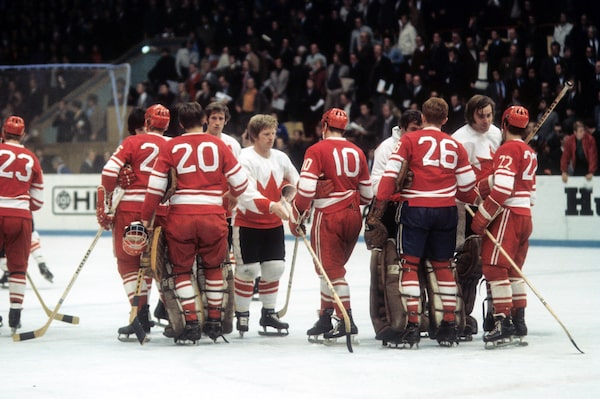
The Soviet Union and Canada shake hands after the Canadians defeated the Russians in Game 8 of the 1972 Summit Series on Sept. 28, 1972 at the Luzhniki Ice Palace in Moscow, Russia.Melchior DiGiacomo/Getty Images
All that progress with the Russians squandered.
It’s been a half-century since the Soviet-Canada hockey series, the landmark clash of Freedom versus Oppression that started us down the road to understanding with the Russians.
Headway was made. But it’s gone now – gone in a flash with Vladimir Putin’s subhuman horror show. My bottle of vodka will remain on the shelf. I don’t want to go near it.
The hockey connection opened a window into the Soviets, for us, and into Canadians for them. In the Cold War, we didn’t have much of a military contribution to make in defending free-world values. Instead, we contributed to détente in another small but important way. We did it through sport.
Russian hockey stars saw Canada as the country of their dreams. They came here and stayed and cultural ties with Russia were formed which other countries did not have.
During the Cold War, Canada-Soviet relations had other high points including the Gouzenko affair and John Diefenbaker’s wrangling with John Kennedy’s White House over nuclear warheads. But nothing made the headlines as often as hockey. When I was stationed in Moscow in the late 1980s and the word “Canada” was mentioned, Russian faces would brighten and we’d talk about the sport, rarely politics.
With the 1972 series, Canadians’ views of the Russian stereotype began to change. The Soviets were supposed to be the brutes but it was our play that was rougher and more bullying and bloody. They amazed us with their intelligent teamwork. They were artistic, the Bolshoi on blades, a socialist symphony. “Courage,” their great hockey guru Anatoly Tarasov said while scolding me about my terrible Russian, “means the ability to stay out of a fight.”
Today, what a mockery Mr. Putin makes of that in turning his empire evil again.
The West is feeling pressure to act in Ukraine – but that would make things even more dangerous
Should we call Putin’s bluff? We already have
On the political side, strides toward understanding were made by Pierre Trudeau, who was often more confrontational toward Washington than the Kremlin, repeatedly badgering Ronald Reagan to take a more conciliatory approach, which he subsequently did.
In the early 1980s, then-agriculture secretary Mikhail Gorbachev toured Canada and it opened his eyes as to the backwardness of his society. Then, as General-Secretary he brought home his Ottawa ambassador, Alexander Yakovlev, who helped him spearhead his far-reaching democratic reform initiatives.
Russian hockey stars were chafing at their year-round confinement in training camps and in quiet corridor chats made clear their desperation to get to Canada. Igor Larionov led the charge, going public against his Stalinist-minded coach Viktor Tikhonov. He and many others made it to the NHL and lit up the league with their patterns and panache and refined play.
Respect grew. With the Cold war’s end, there was much for the world’s two largest land-mass countries to build on. Boris Yeltsin, the Gorbachev successor, was half-tanked about three-quarters of the time but he was a man of democratic spirit. His people were moving in that direction.
While welcoming new freedoms, they were steeped in authoritarian culture. They could go either way. So much would depend on who controlled the messaging. When the little KGB thug took over, the authoritarian backtrack began. It happened slowly at first, so as not to raise suspicion. But the screws gradually tightened until his totalitarian instincts took over, resulting in what we see today.
Fiftieth-anniversary celebrations of the 1972 series are to be held later this year. One wonders how, if they’re invited, the Russians will be welcomed.
Russia’s prodigious goal scorer Alexander Ovechkin, so admired just a few weeks ago, is decried now for his staunch support, prior to the Ukraine assault, of Mr. Putin as are other Russian players who haven’t denounced the despot. To be borne in mind is that they have families and relatives in Russia and to condemn their dictator would very likely bring on serious reprisals.
The legendary Russian goalie Vladislav Tretiak recalled the 1972 series one time. Of the first game, which his team went on to win, he allowed two goals in the first few minutes. “I remember the organ man,” said the goalkeeper. “He started playing funeral music.”
Fifty years on, the funeral music now plays for Canada-Russian hockey and relations between the countries. Unless and until Mr. Putin is ousted it won’t be the same. The hockey peace bridge that facilitated Canada-Russia relations and Cold War ties has crumbled.
Keep your Opinions sharp and informed. Get the Opinion newsletter. Sign up today.